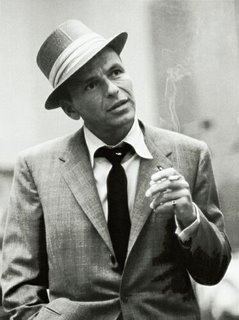Sinatra

One of the great pop singers, perhaps the greatest, of the 20th century was born on this day in 1915 in Hoboken, New Jersey.
The son of an ex-boxer, Francis Albert Sinatra quit school early to sing like his early idol Bing Crosby, and at 19 he won Major Bowes’ Amateur Hour radio contest as part of the Hoboken Four. As a soloist he got a steady gig with the Harry James Orchestra, then with Tommy Dorsey’s band, but when he branched out on his own in 1942, he transformed the pop culture landscape.
Skinny and big-eared but with a warm, husky and sensitive voice and undeniable charm, Sinatra’s fanatically loyal teenaged female fans -- known as his bobby-soxers -- began to shift the focus of the pop music industry from bands to singers, and in effect became the prototype of all teen idols. Unlike many who followed, Sinatra had genuine talent, bringing smoothness and precise enunciation to the still-developing genre of microphone singing, displaying a natural gift for subtly shading song lyrics, a value little appreciated in mainstream popular music outside of Billie Holiday (to whom he often acknowledged his debt) until Sinatra showed the way.
Hollywood recognized his charisma and put him in a few popular but lightweight musical comedies (notably, with Gene Kelly, Anchors Aweigh, 1945, and On the Town, 1949), but his career took a downward spiral coincident with the news that he was leaving his wife and 3 children for starlet Ava Gardner. Branded box office poison for the scandal surrounding his romance, Sinatra struggled by singing in nightclubs until, through his new wife’s influence, he landed the role of "Maggio," the wry, pathetic Army private, in Fred Zinnemann’s film of James Jones’ novel, From Here to Eternity (1953). He won a best supporting actor Oscar for his performance, propelling him into a whole new career as a serious actor, capped by his performances in prestige productions such as The Man with the Golden Arm (1956) and The Manchurian Candidate (1962, directed by John Frankenheimer).
The comeback was remarkable, but not as remarkable as the transformation of "Sinatra -- teen idol" to "Sinatra -- chairman of the board": as his tempestuous relationship with Gardner burst at the seams, Sinatra began to record a series of long-playing records (another departure from the norm -- Sinatra was the first great advocate of the thematic LP as a pop music medium) at Capitol Records by which he reinvented himself as the "most magnetic musical communicator and the ace mood-pitcher of the era" (as one biographer has put it).
Although he was not a jazz singer (a brief, promising fling with bossa nova and Antonio Carlos Jobim being the exception), his mature recordings showed a jazz man's grasp of the rhythm of pathos (the "tempo of the heartbeat" he called it), hanging back on the beat and letting his lush accompaniment lure him along. Adding a world-weary, bitter-edged swagger to his already evocative style in albums such as Songs for Swingin’ Lovers (1955), In the Wee Small Hours (1955), Come Fly With Me (1958) and September of My Years (1965), Sinatra laid down the definitive pre-rock pop music statements about grown-up love -- the great giddy heights as well as the regret and loss.
His swagger was a hallmark of his tabloid persona as well, as the defiantly pleasure-seeking hipster with the cool veneer and a volcanic temper underneath, the powerful star with rumored mafia connections, he was the ring leader of the "Rat Pack," an unofficial group of show biz cronies at the top of their form (Dean Martin, Sammy Davis, Jr., Peter Lawford, Joey Bishop and sometimes Shirley MacLaine), cutting up and living the high life together in public. As such, Sinatra in the late 1950s and early 1960s was the middle-class American male hero: would that I could be Frank Sinatra, said the traveling salesman or the factory foreman, I would sling my coat over my shoulder with one hand, wear my fedora and my shirtsleeves, swig hard liquor from hi-ball glasses, flirt with broads in nightclubs and not take any crap from anyone. Luxury cars, cigarettes, steak dinners, Palm Springs, Vegas -- Sinatra said this was the way to live one’s life, with his jaded stylings over a Billy May arrangement at 33 rpm.
After throwing his weight behind party-pal John Kennedy's presidential campaign in 1960, he was ostracized by the White House due to his mob ties (conspiracy theorists love to speculate that when Sinatra's mob friends perceived that Sinatra had lost his White House playmate and any protection that gave them, they retaliated against Kennedy), and soon thereafter Sinatra's public party went private. After a brief and improbable marriage to 21-year old flower child Mia Farrow, Sinatra settled down to concert touring and charity with 4th wife Barbara Blakeley (the ex-wife of Zeppo Marx). In his later years, his music increasingly took a darker turn, although he remained one of the biggest draws in show business until shortly before his death.
Labels: Classic Cinema, Classic Pop Music, Pop Culture





2 Comments:
Without any question there has been and never will be an American entertainer with such an incredible impact on the American culture.
check out Bono's introduction of Francis Albert at the 1994 Grammys:
http://www.mtv.com/news/articles/
1434089/19980515/nullsinatra_frank.jhtml
"Probably the best introduction I've ever had" he would say later.
I'd have to agree...
Post a Comment
Subscribe to Post Comments [Atom]
<< Home